After two trip postponements due to bad weather, the Uncharted Philippines Adventure Team finally pushes through with its reconnaissance of the Babuyan Islands. These are the daily accounts of our (mis)adventures.
Oh the things we go through to live up to our slogan...
Day 1
Unable to find a volunteer to give my dog Orco his daily five mile run while I'm away, I decide to bring the 55 pound Samoyed along. The bus won't let Orco into the passenger cabin, so we take the company vehicle and make the 12 hour overnight drive from Manila to Luzon's northernmost point – literally the end of the road. Zean, Jeff and I take turns with three tasks: driving, navigating and conversing with the driver to keep him awake. Driving is made challenging by the pile of gear blocking most of the rear window and Orco moving up front every half hour to block most of the windshield.
Day 2
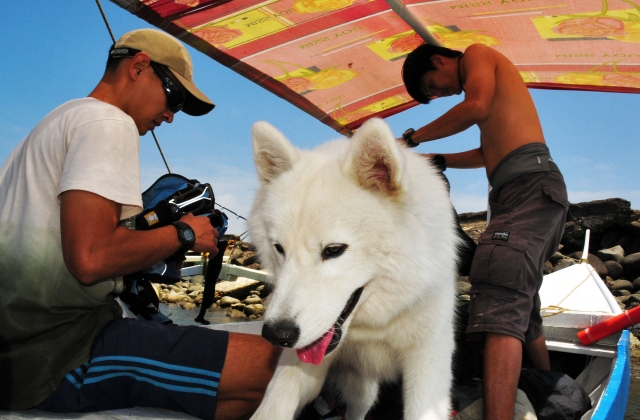 photo by Zean Villongco
photo by Zean Villongco
Upon arrival at the pier, we discover that we have forgotten an essential item: sunscreen. The local market does not carry any, but has at least 10 different brands of skin whiteners. Resigned to our toasted fate, we board our boat to explore Palaui Island.
The western side of the island is lined by virgin rock walls that beckon would-be first-ascenders to climb them. The rock is solid according to the boatman, so we make a difficult shore landing on wave-beaten rocks and scramble over to the base of a 150-foot wall. Zean and I gush over the bullet-hard rock as we get our rope and rack in order.
Forty feet up on the wall however, handholds come off in head-sized blocks. It is a troubling place to discover that the rock higher up the crag is fractured and as stable as a stack of Jenga. I back off and lower to the ground.
Not inclined to leave expensive climbing equipment on the cliff, Zean goes up the same crumbly route that I took and climbs down to retrieve the gear. It is a risky operation but one that we are familiar with, this not being the first time we bit off more than we can chew.
Zean is fifteen feet off the ground with only one more piece of gear to retrieve. A block the size of his torso breaks off under his weight and he falls. He slams against the rock wall then continues to fall towards the ground. Before he hits, the belay catches and I, acting as counterweight, am pulled off my feet and thrown against the cliff.
Zean earns stitches on his chin and knee. I walk away with bruises and scrapes. Jeff turns down our invitation to teach him how to rock climb.
Day 3
The show goes on. Armed with painkillers, the conviction that saltwater is good for wounds, and the determination not to let something as small as a near-death experience stop him from having a great adventure, Zean resolves to continue the expedition.
We spend another day in Palaui, our plan to go to Camiguin Island foiled by an unreturned nautical compass that we needed to go out to sea. Jeff and I spend the day skin diving a marine sanctuary and trekking through the island, passing forests, mangroves, tidal flats and meadows. Orco joins the hike and displays his breed's herding ability by rounding up a group of goats. His inclination to bite the kids (young goats, not children) is worrisome. Zean is unable to join the hike but manages to hobble up to the island's most spectacular vantage point: a cliff top lighthouse overlooking the Pacific. Island dogs keep Orco company at the campsite.
Day 4
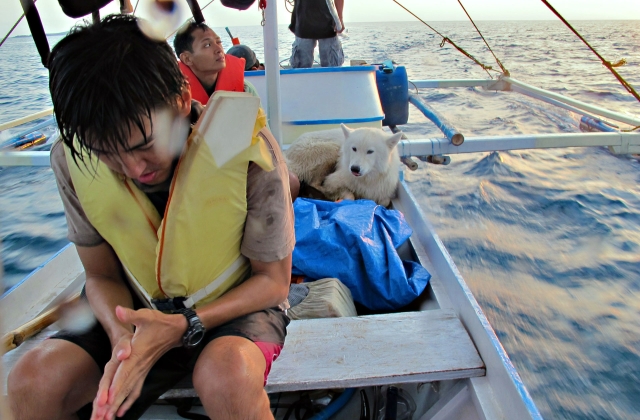 photo by Zean Villongco
photo by Zean Villongco
We awake to find our food gone, with litter scattered all over the campsite. We learn that island dogs eat chips, soup mix and powdered coffee.
The boat ride to Camiguin is rainy and cold. We are on the lookout for humpback whales but the visibility is too poor to spot them. Dramatic rock cliffs line the southern coast of Camiguin, but climbing has been taken off the menu for this trip. We spend the day skin diving, hiking into the island's interior of farmlands, mountains and rivers, and eating a strange but delicious crustacean called curacha or spanner crab.
Day 5
Five in the morning, and we are already out at sea. For every 10 feet that our boat moves forward it moves 40 feet up and down on gigantic waves. The driving rain adds misery to danger, and after an hour and a half out on the water, we turn back and return to Camiguin. Stranded, wet and cold, we spend the better part of the day sleeping and warming ourselves with cheap local brandy. In mid-afternoon we force ourselves into action and hike along Camiguin's coastline of beaches and tidal flats.
In the evening the substitute boat captain lives up to his reputation as a lush. He single-handedly downs a bottle of gin and repeatedly contradicts himself regarding the advisability of going out to sea in the morning. He is incoherent at nine and unconscious by midnight, but wakes up grumbling and fumbling around for his nautical tools at 3:00AM.
Day 6
The boat captain is still groggy and drunk when the boat pushes off from shore. But the fifteen foot high waves quickly have him wide-eyed sober. The ocean does not seem to be any less treacherous than yesterday, but the sun is out and the boat crew is encouraged. After a four-hour roller coaster ride, we reach the shores of Calayan Island.
We take a smaller boat to ply the coast that is dotted by interesting rock formations. The smaller boat allows us to come ashore where the bigger boat cannot, and we explore a sea cave that has tidal pools, edible birds' nests and fresh springs. Jeff and I dive into a pool and swim out through an opening to the open sea. Zean, still unable to bend his injured knee and swimming with only his arms, does the same. He claims swimming from the darkness of the cave into the light of the open sea was a fantastic experience that was worth his calculated risk. Before heading back to the beach where we would camp, we stop by a waterfall to rinse off the saltwater.
Day 7
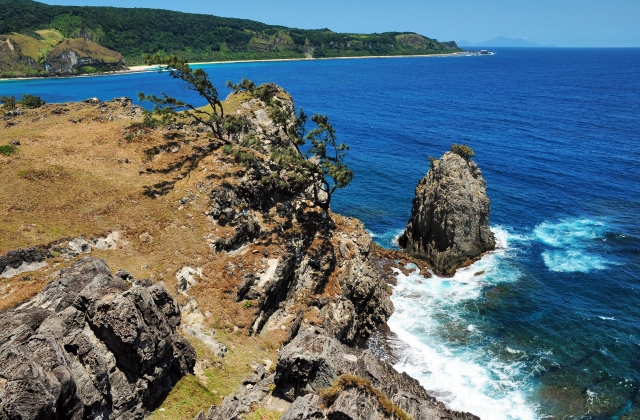 photo by Zean Villongco
photo by Zean Villongco
Again we are stranded. The captain declares that the ocean is too rough to go to Babuyan Claro, the most remote of the Babuyan Islands, and that we need to spend another day in Calayan. Again this turns out to be a fortunate delay.
We hop on motor scooters and ride across the island. Locals turn their heads at the sight of Orco on a scooter.
We arrive at the most spectacular place I have seen in the Philippines. Even Orco realizes its exceptional beauty and plays frenziedly in the surf. We are in a huge cove, with a kilometer-long beach of tiny sparkling white pebbles that feel like sand. On the left end, potable spring water trickles down rock walls onto the beach. Near this, coconut trees stand in a grove. In the middle of the cove is a rock tower and beside it is another rock formation that creates dramatic sprays when waves hit it. To the right of the rock formation and extending to other end of the beach are tidal flats. Here locals gather shells and hunt for octopi. The far right end of the cove is a windswept bluff with trees permanently bent in one direction. The cliffs are sheer, white and mesmerizing. I long for my rope and climbing gear but I left them back in the mainland after Zean's accident. The bottom of the cliffs is dotted by sea caves and the turquoise water reveals coral reefs. Inland are meadows with grazing goats.
Goats. Orco runs amok. He charges and has a kid's spine in his jaws by the time I catch up to him. I yell and he lets go of the ill-fated juvenile but runs after another full-grown individual. The kid is still alive but doesn't get up, and I leave it to run after my Samoyed-turned-wolf. Orco chases the adult goat over rocks and into shallow water and brings the animal down by its neck, shaking vigorously to snap it. I throw a rock near Orco and succeed in distracting him. I manage to shout him into a down position and get him on his leash. The goat cries and struggles in the water and can't get up. In shock, I inform our host that my dog has killed two goats and that I will pay for them. I anticipate a costly excursion for Orco and goat stew for dinner. When we return to the kill sites however, the goats are gone. Orco had not killed them after all and they recovered after their initial trauma. Orco stays on leash for the rest of the day.
Day 8
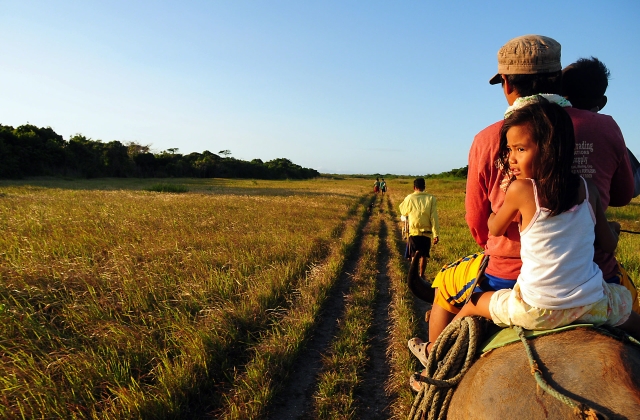 photo by Zean Villongco
photo by Zean Villongco
The wind prediction for the day is 5 on a scale of 0 to 10, 0 being a mirror-like ocean and 10 being the perfect storm. By the standards of the area, conditions are as good as they get. Twenty minutes into our journey to Babuyan Claro, however, and we are in Six Flags once again. The way to Babuyan Claro is directly against the prevailing northeasterly winds and this makes going there impossible even when the rest of the ocean is calm. We decide to write off the volcano island for this trip and head for the final two islands of the Babuyans.
Dalupiri is a chunk of rock that rose up from the bottom of the ocean. This is evidenced by fossils of corals and shells on its plateaued peak. We circle the island and skin dive its coral reefs. Then we come ashore at a fishing village with quaint huts and hike up to the top of the island for a fantastic view.
Fuga is our last stop. After a week of exploring islands characterized by cliffs and mountainous terrain, this flat island comes as a unique and welcome change. We hike through plains of tall grass broken up by patches of thick forest. Zean, still hobbling, gets a ride on a water buffalo-drawn cart. We spend our final evening camped on the beach as always, this being our seventh straight night outdoors. Jeff declares that his tent has officially earned its acquisition cost.
Day 9
The friendly community leader of Fuga comes early in the morning to give us a gift: two coconut crabs, each weighing over a kilogram, rolled up and tied in a sack. We anticipate a unique lunch.
We set out at 5:30AM. The waves, once again, are huge. We spend five hours at sea and the mainland is within sight. The captain declares that we are almost half way. Jeff, Zean and I make a wager on what time we get back to our port of origin. I say 2PM. Zean 3:00. Jeff 2:30.
We arrive at 5:30PM. Twelve hours on a boat, constantly tossed up in the air and slammed back down by gigantic waves, is an ordeal I do not wish on my worst enemy. I implement an encouragement technique I learned from blind adventurer Erik Weihenmayer called positive pessimism and say to myself, "We may have spent 12 hours on a boat in ridiculously rough water, but at least the 12 hour drive back to Manila is still ahead of us."
Zean gets his stitches removed, and his wounds have healed nicely, though he is still unwilling to bend his knee for fear of reopening Mr. Smiley. Jeff and I treat him to dinner for winning the time of arrival bet. We get on the road at 9PM, drivers now limited to Jeff and myself. We take a different route from the one we used coming up, avoiding a stretch of sketchy, unpaved road. I take first shift while Jeff gets some sleep. Zean and I recount our eventful expedition, thinking the adventure is over.
The road ends abruptly with a barrier of rocks. I slam on the brakes but it is too late. According to Zean, Jeff lets out a girlish scream, but I do not hear it. Our vehicle plows through the rocks and stops ten feet short of where a bridge used to be. I am certain that the vehicle is totaled and prepare myself for a very long night. When I step out to assess the damage, however, I witness a small miracle: all the tires are intact and the vehicle looks unscathed. Unfortunately, the only way to proceed is to go back over the watermelon-sized rocks to the unlighted, unmarked detour. We crash back over the barrier listening to the unnerving music of metal on rock. Back on the road I notice no change in our vehicle's performance or handling other than a slight pull to the right. I make a mental note to contact Nissan regarding an endorsement for their X-Trail model.
Day 10
We each get home at around 9AM and face the decision of what to do first: sleep or begin the arduous task of rinsing our gear clean of salt. I opt to clean my gear, answer email and attend to various responsibilities, such as cooking the monstrous coconut crabs. I set a personal record of consecutive hours awake: 43.
In ten days I learned the hard way why so few people go to the Babuyan Islands. My team has taken many notes and things can be done better next time – that's what recon trips are for – but the expedition is inherently long, rough and plagued by uncertainty. More importantly, however, I discovered what rewards await the daring few who do explore the Babuyan Islands. Authentic adventure. Unspoiled nature. The lengths we go to live up to our slogan.

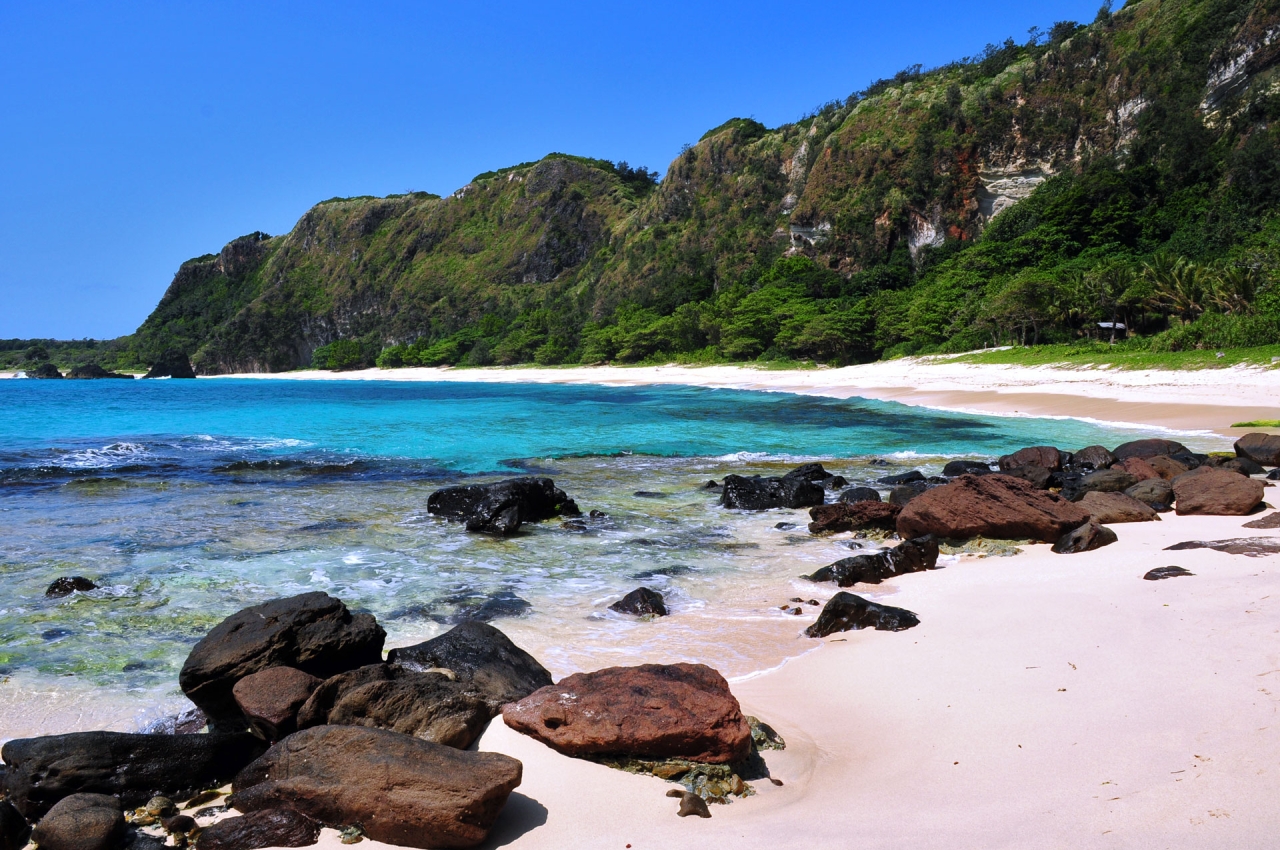 photo by Zean Villongco
photo by Zean Villongco